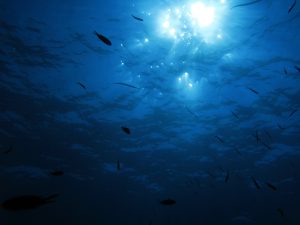What the Pacific Island nations lack in landmass, they make up for in territorial waters. For instance, Kiribati ranks 172nd in the world for its land mass, but ranks 12th for the size of its exclusive economic zone (EEZ), which takes into consideration a country’s authority over both land and water.
Altogether, the Pacific Island nations, despite having a combined population of just 11 million, control nearly 12 million square miles of the Pacific Ocean across an area equivalent to around 15 percent of the globe’s surface.
The ocean is of such importance to the Pacific Island countries that they’ve formed a collective identity around it, which has come to be known as the “Blue Pacific.” This serves to strengthen regional solidarity in the face of global powers’ efforts to influence them.
Now, Pacific Island nations are looking to the ocean to save them from the COVID-19 induced economic downturn. Some Pacific Island nations, namely those that border the resource rich Clarion-Clipperton Zone (CCZ), have begun sponsoring mining companies to take out licenses for deep-sea mining.
The CCZ, which borders the territorial waters of the Cook Islands, Kiribati, Nauru, and Tonga, is a deep-sea trench approximately the size of Europe. It holds a calculated 21 billion tonnes of polymetallic nodules that contain mostly manganese, but also iron, nickel, copper, titanium, and cobalt. Such metals are in increasing demand amid a push to develop batteries for electric vehicles and renewable energy.
According to the United Nations International Seabed Authority’s (ISA) list of “reserved areas,” which ensures developing countries can access deep sea mineral resources, Tonga has sponsored contractor Tonga Offshore Mining Limited, Nauru has sponsored the Nauru Ocean Resources Inc., Kiribati has sponsored the Marawa Research and Exploration Ltd., and the Cook Islands has sponsored the Cook Islands Investment Corporation. The four companies have a combined reserved area of about 120,000 square miles.
Despite it being nearly half a century since scientists and prospective miners discovered the lucrative mineral deposits on the floor of the ocean, little mining has taken place and few studies completed to understand the risks of such mining if it was to become a full-fledged industry.
But the industry has picked up momentum in recent years, with mining companies now pouring millions into developing technology that would allow them to operate at the depths required. The COVID-19 induced economic downturn has also led to countries with access to deposits, such as the Cook Islands, Tonga, Kiribati, and Nauru, wanting to cash in.
With advanced technology, an appetite among investors, and a willingness among Pacific Island nations to hand out licenses, mining companies are ready to go but one thing still stand in their way: Countries are yet to agree on a code for regulating extractive mining, to ensure resources that are not exclusively in any one nation’s jurisdiction are shared and to prevent damage to the environment.
The ISA assembly, in which 168 nations are members, was supposed to meet in 2020 to agree on a framework but the gathering was postponed due to the pandemic. Now, as exploration licenses come to an end, mining companies, along with their host countries, will begin heaping on pressure to begin granting exploitation licenses.
Once a framework is agreed upon and licenses are handed out, it’s the Pacific Islands region that will see the most mining. Of the 19 exploration contracts approved by the ISA, 17 are in the CCZ. Other areas of interest to deep-sea mining companies include the Penrhyn Basin, which is within the Cook Islands’ exclusive economic zone. That means the Cook Islands government has the sole right to mine the area or to award mining licenses to foreign companies to do so. Other, albeit smaller, areas of interest are the Peru basin off the coast of Peru and an area just south of India’s exclusive economic zone, in the Indian Ocean.
While a handful of Pacific Island nations were quick to grant exploration licenses in the CCZ, they will likely be much more hesitant to back granting exploitation licenses, due to their vulnerability to climate change and environmental impacts of mining.
According to a marine resources report, deep-sea mining would lead to the disruption of rare, sensitive organisms on the ocean floor, the destruction of habitats, and an increase in noise pollution, which could force marine mammals such as dolphins to flee from their natural areas.
Beyond this, however, the possible impacts are little understood. Ecologist Hjalmar Thiel told Nature Magazine that a 30-year experiment looking at the potential impacts of commercial deep-sea mining is still inconclusive, but they have found that areas mined for the experiment have still not recovered.
“The disturbance is much stronger and lasting much longer than we ever would have thought,” said Thiel.
A report commissioned by Deep Sea Mining Campaign and MiningWatch Canada, in which the authors analyzed more than 250 peer-reviewed scientific articles on the subject, concluded that the impacts of mining deep-sea polymetallic nodules would be extensive, severe, and last for generations, causing essentially irreversible species loss. The report found that a moratorium, which would allow scientists more time to determine the risks, is the best next step.
A Greenpeace report published late last year found the leading proponents for deep-sea mining in the region are corporate entities that are “geographically, politically, and economically removed from the small island nations that will bear the brunt of the consequences.”
Jessica Desmond, an oceans campaigner for Greenpeace, said deep-sea mining would exacerbate the impacts Pacific Island nations are already facing due to the climate crisis.
“Scientists have repeatedly warned that deep-sea mining would have terrible consequences for ocean ecosystems we barely understand, but giant machines are already being lined up for experimental mining of the Pacific Ocean seabed,” she said, ahead of planned protests against DeepGreen, a Vancouver based company spearheading the push to mine the Pacific.

































